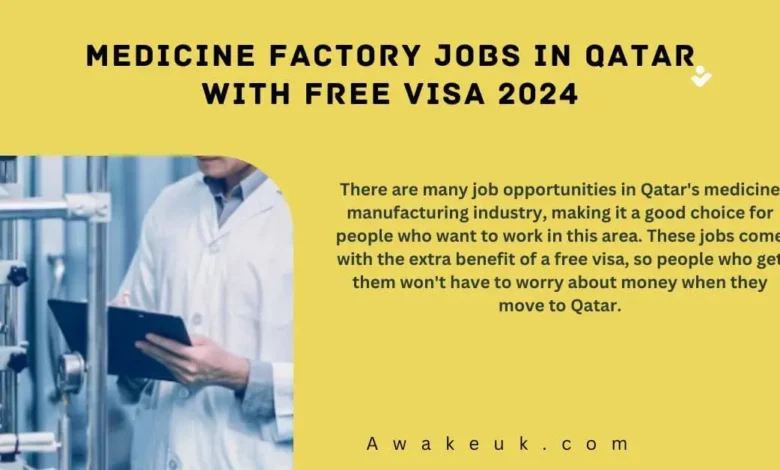Medicine Factory Jobs in Qatar with Free Visa 2024

There are many job opportunities in Qatar’s medicine manufacturing industry, making it a good choice for people who want to work in this area. These jobs come with the extra benefit of a free visa, so people who get them won’t have to worry about money when they move to Qatar.
People who work in a medicine factory in Qatar not only have a stable job but also have the chance to make a real change in people’s lives by contributing to the healthcare industry. This blog will have a lot of information about working in a medicine factory in Qatar, such as how to get a free visa.
Details of Medicine Factory Jobs in Qatar with Free Visa:
- Country of Employment: Qatar
- Industry: Manufacturing/Factory
- Job Title: Medical Factory Worker
- Minimum Required Experience: 1 year
- Educational Qualifications: Not required
- Age Limit: None
- Visa Support: Available
- Relocation Assistance: Provided
- Accommodation: Included
- Employment Type: Permanent and Full-Time (Contingent upon Visa Extension)
- Monthly Salary: Qatari Riyal 1,500
Requirements:
- No Educational Qualifications Required: You do not need to have a certain educational background. People with a variety of educational skills can join, as well as people who have never been to school.
- No Experience Needed: You don’t need to have done a similar job before. This is a good chance for people who are just starting their jobs or who want to make a change.
- Physical Fitness: Applicants for the job must be physically fit and able to do hard physical work. It includes doing things that might require lifting, moving things by hand, and standing for long periods.
Job Duties of Medicine Factory Jobs in Qatar:
As a Medicine Factory Worker in a fast-paced manufacturing setting, you have a lot of important duties to do to make sure the facility runs smoothly and efficiently. Here is a more detailed list of the tasks of the job:
- Maintaining a Clean and Safe Workspace: It is very important to make sure that the workplace is clean, organized, and safe. This includes keeping the workplace clean and organized so that there aren’t too many dangers and everyone feels safe.
- Efficient Handling of Inventory: This job involves loading and unloading delivery vehicles and receiving packages of inventory quickly. To keep the goods from getting damaged during transport, this has to be done carefully and methodically.
- Inventory Verification: The Medicine Factory Worker is in charge of checking the received inventory, counting things to make sure they are in the right number of places, and looking over the inventory for any damage or flaws. This careful checking makes sure that only high-quality items that aren’t broken move on to the next step in the manufacturing process.
- Error Communication: Any problems or differences that are found during the verification process are quickly shared with the right people. To fix mistakes and keep production running smoothly, communication must be quick and clear.
- Inventory Organization: Labeling and marking your stock is an important part of managing your inventory well. Labeling goods helps keep track of items and makes it easier to get what you need when you need it.
- Storage and Accessibility: It’s important to store goods in a way that makes it easy to find when it’s needed for production. Keeping things in order makes it easy to find things quickly, which cuts down on delays and keeps operations running smoothly.
Benefits of Medicine Factory Jobs:
- Job Stability: The pharmaceutical industry is indispensable and continues to expand, ensuring the steady employment and security of employees in pharmaceutical manufacturing facilities.
- Competitive Salaries: The significance of the work in the production of essential medications is often reflected in the competitive salaries and benefits that are often associated with jobs in medicine factories.
- Comprehensive Benefits: Employees are generally granted comprehensive benefits packages, which encompass health insurance, retirement plans, paid leave, and occasionally tuition reimbursement.
- Career Development: The pharmaceutical industry offers a plethora of opportunities for career advancement, enabling employees to specialize in various fields or ascend the hierarchy.
- Skill Development: Quality control, production techniques, technical skills, and adherence to regulatory standards are among the skills that can be developed through employment at a pharmaceutical factory.
- Contributing to Public Health: Providing a strong sense of purpose and fulfillment, employees in medicine factories play a crucial role in the production of medications that enhance and save lives, thereby contributing to public health.
- High Demand: The pharmaceutical industry is sustained by a high demand for its products, which guarantees ongoing employment opportunities.
- Training and Education: A multitude of pharmaceutical organizations provide employees with educational and training opportunities to improve their abilities and expertise.
- Technological Exposure: Employees are frequently exposed to state-of-the-art apparatus and processes in medicine factories, which frequently implement advanced technology and automation.
- Safety and Standards: The pharmaceutical industry is meticulously regulated to guarantee that medicine factories adhere to rigorous safety and quality standards, thereby fostering a secure work environment.
- Diverse employment Opportunities: Medicine factories provide a diverse range of employment positions, such as production, quality assurance, research and development, packaging, and logistics, to accommodate a wide range of skill sets and interests.
- Work-Life Balance: Numerous pharmaceutical organizations provide employees with the opportunity to maintain a healthy work-life balance by offering flexible working hours and schedules.
- Employee Well-Being: Pharmaceutical companies frequently prioritize employee well-being by providing supportive work environments, wellness programs, and health initiatives.
- Team Collaboration: The work environment at a medicine factory necessitates the development of communication and cooperation skills through collaboration with a variety of teams.
- Community Impact: Employees contribute to the health and well-being of their communities by participating in the production of essential medications.
- Global Opportunities: The skills and experience acquired in a medicine factory can provide access to employment opportunities in the pharmaceutical industry on a global scale.
- Environmental Responsibility: A significant number of pharmaceutical companies are dedicated to sustainable practices, which enable employees to participate in environmental conservation initiatives.
- Innovation and Research: Medicine factories frequently engage in innovative research and development, which offers the chance to work on new and enhanced medications.
- Problem-Solving: The position is intellectually stimulating and dynamic due to the frequent need to rectify and solve problems.
- Employee Recognition: Numerous pharmaceutical organizations implement initiatives to acknowledge and compensate employees for their contributions, thereby cultivating an environment that is both motivating and positive.
How To Apply For Medicine Factory Jobs In Qatar?
Should you be interested in this position, please visit the link provided below.
Frequently Asked Questions:
-
How can I easily find a job in Qatar?
Websites, such as Bayt, GulfTalent, and Qatar Living Jobs, are dedicated to the search for employment in the region. These platforms offer opportunities across various industries and options for individuals with varying degrees of experience.
-
How can I become a doctor in Qatar?
Pass the required certification exams (e.g., the USMLE for Qatar and the USA). Obtain a medical license from QCHP (the Qatar Council for Healthcare Practitioners). Complete an accredited residency program (3–6 years, depending on the specialty). Complete a fellowship program (sub-specialization) (1–3 years).
-
What is the pharmaceutical industry overview?
The pharmaceutical industry is a complex system of processes, operations, and organizations involved in drug discovery, development, and manufacturing. It includes research and development activities, the development and manufacture of active pharmaceutical ingredients (APIs), and the production of drugs.



